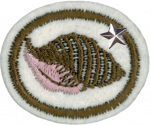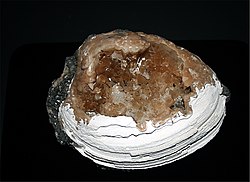Especialidades JA/Moluscos - Avanzado/Respuestas
| Moluscos - Avanzado | ||
|---|---|---|
| Asociación General
|
Destreza: 3 Año de introducción: 1949 |
|
Requisitos
1
Para consejos e instrucciones, véase Moluscos.
2
3
There are ten classes of molluscs; eight of the classes have living representatives, the other two classes are known only from fossils. More than 250,000 species of mollusc are recognized and named. Snails (Gastropoda) account for about 80% of living mollusc diversity.
4
4a
4b
4c
4d
4e
4f
5
5a
5b
5c
5d
5e
5f
5g
5h
5i
5j
5k
5l
5m
5n
5o
5p
6
In those molluscs which have a shell, the shell grows gradually over the lifetime of the mollusc by the addition of calcium carbonate to the leading edge or opening, and thus the shell gradually becomes longer and wider, in an increasing spiral shape, to better accommodate the growing animal inside. The animal also thickens the shell as it grows, so that the shell stays proportionately strong for its size.
7
The West Indian Fighting Conch is an aggressive sea snail with a nasty sting which it uses to defend itself against marine predators. These shells are best collected when the tide goes out, as great numbers of them suddenly emerge from the sand and retreat to the surf. If one is flipped over, it can right itself using its sharp operculum.
8
9
molluscs have few requirements in order for them to thrive. They need moisture, but if they find themselves in a dry environment, they are able to seal themselves (and their moisture) inside their shells until external moisture becomes available again. Thus, molluscs can be found in nearly every habitat on Earth - even deserts!
10
11
11a
11b
11c
11d
11e
11f
Many people find the very rounded, shiny, porcelain-like shells of cowries pleasing to look at and to handle. Shells of certain species have historically been used as currency in several parts of the world, as well as being used, in the past and present, very extensively in jewelry, and for other decorative and ceremonial purposes.
11g
Tibetan Buddhists make use of a particular set of eight auspicious symbols, ashtamangala, in household and public art. The chank shell or conch is one of these eight symbols:
- Conch
- Knot
- Fish
- Banner
- Lotus
- Parasol
- Urn
- Wheel
11h
11i
12
- Musical Instruments
- Key touches and various decorations on musical instruments such as saxophones, trumpets, violins, banjos, tamburitzas and guitars are sometimes made of mother of pearl. It is used as inlays on many guitar fretboards.
- Clothing
- Mother of pearl buttons can be found on a variety of clothing such as shirts, skirts and coats.
- Decorative Inlays
- Nacre is also used as a decorative feature of watch faces, knives, guns and jewelry.
- Building Material
- Instead of using a marble or tile base, the mother of pearl tesserae can be glued to a fiberglass mesh. The result is a lightweight material that offers a seamless installation, and there is no limit to the sheet size. Mother of pearl sheets may be used on interior floors, exterior and interior walls, countertops, doors and ceilings. Insertion into architectural elements, such as columns or furniture is easily accomplished. Conch shells are occasionally used as a building material, either in place of bricks or as bulk for landfill.
- Jewelry
- Pearls are highly prized jewelry components.
- Souvenirs
- In some countries, cleaned Queen Conch (Strombus gigas) shells or polished fragments are sold, mainly to tourists, as souvenirs or in jewelry. Without a permit, however, export is a breach of CITES regulations and may lead to arrest. This is most likely to occur on return to the tourist's home country while clearing customs. In the UK conch shells are the ninth most seized import.
- Pets
- Snails are often kept in aquariums along with fish.
13
- a. Personalmente encontrar y recolectar 40 especies de conchas que representan a las cinco clasificaciones. Hacer una lista de cada molusco con el lugar y la fecha en que fue encontrado, nombre común, nombre científico y la clase.
- b. Hacer una colección de 50 especies de conchas que ha encontrado, recibido o comprado que representen las cinco clasificaciones.
- Hacer una lista de cada concha recogida de la siguiente manera: si la encontró personalmente, dar la información solicitada en el punto «a»; si la recibió o compró, dar el nombre de la persona de quien recibió la concha, el hábitat de la concha, la fecha de su adquisición, su nombre común, nombre científico y la clase.
The best approach here is to get a good field guide and then try to identify the shells you have found.
If you opt to purchase your collection, one possibility is to start with a kit containing specimens from all five of these classes. Seashells.com carries a such a kit, reasonably-priced.
References
- http://depts.washington.edu/natmap/mollusks/glossary.html
- http://www.informaworld.com/smpp/content~content=a793157051~db=all~jumptype=rss
- http://seachestsecret.questacon.edu.au/assets/Delve_Deep_-_Pearl_Oysters.pdf
- Categoría: Tiene imagen de insignia
- Adventist Youth Honors Answer Book/Honors/es
- Adventist Youth Honors Answer Book/es
- Adventist Youth Honors Answer Book/Skill Level 3/es
- Categoría: Libro de respuestas de especialidades JA/Especialidades introducidas en 1949
- Adventist Youth Honors Answer Book/General Conference/es
- Adventist Youth Honors Answer Book/Nature/es
- Adventist Youth Honors Answer Book/Nature/Primary/es
- Adventist Youth Honors Answer Book/Stage 0/es
- AY Honors/Prerequisite/Shells/es
- AY Honors/See Also/Shells/es
- Adventist Youth Honors Answer Book








